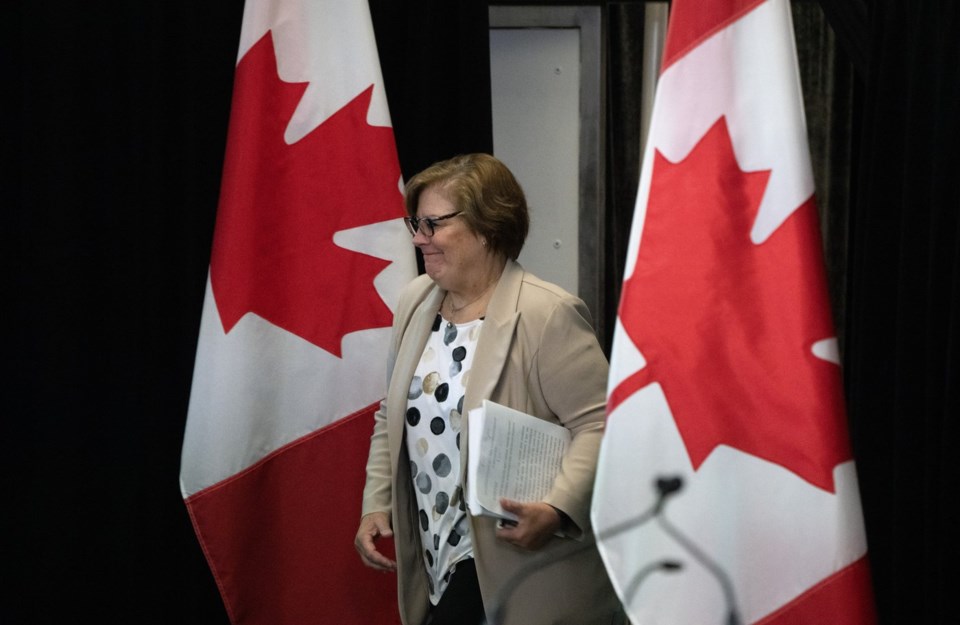OTTAWA — The head of a federal inquiry into foreign interference says she will not be publicly identifying parliamentarians suspected by a spy watchdog of meddling in Canadian affairs.
The National Security and Intelligence Committee of Parliamentarians raised eyebrows earlier this year with a public version of a secret report that said some parliamentarians were "semi-witting or witting" participants in the efforts of foreign states to meddle in Canadian politics.
Although the NSICOP report didn't name individuals, the blunt findings prompted a flurry of concern that members knowingly involved in interference might still be active in politics.
The commission of inquiry subsequently agreed to examine the findings.
As inquiry hearings resumed Monday, commissioner Marie-Josée Hogue indicated that she and her staff had identified and reviewed the intelligence reports referred to in both the classified and public versions of the NSICOP report.
The commission then requested, and obtained, the information and intelligence forming the basis of these reports. It reviewed them and then requested, and obtained, further information and intelligence relevant to the events.
With all this information and intelligence, the commission proceeded to examine senior government officials and intelligence agencies behind closed doors, Hogue added. These witnesses will be heard again at open inquiry hearings.
But Hogue cautioned that the NSICOP report's allegations are based on classified information, which means the inquiry can neither make them public, nor even disclose them to the people in question.
As a result, the commission of inquiry won't be able to provide the individuals with a meaningful opportunity to defend themselves, she said.
"Canada is a state governed by the rule of law, which recognizes and protects the fundamental rights of every individual, including the right to fully defend oneself against charges and accusations," Hogue said.
Procedural fairness entrenches a similar principle, she said.
In addition, the Inquiries Act expressly prohibits the commission from making an adverse finding against a person — in other words, a conclusion that will bring discredit on that person or tarnish their reputation — unless the person has been given notice and allowed full opportunity to be heard with respect to the claims, Hogue said.
However, she added, the commission plans to address the NSICOP allegations and make recommendations in the classified version of the inquiry's final report.
"Some information cannot be revealed publicly without jeopardizing national security," Hogue told the inquiry in French on Monday.
"That being said, I am confident that the information that will be disclosed will be sufficient to enable the public to understand the findings I will make, the conclusions I will draw and the recommendations I will propose."
Prime Minister Justin Trudeau and key government officials took part in the commission's initial fact-finding hearings last spring on allegations of foreign interference in the 2019 and 2021 federal elections.
Hogue's interim report, released in early May, said foreign meddling by China did not affect the overall results of the two general elections.
The report said while outcomes in a small number of ridings may have been affected by interference, this cannot be said with certainty.
In the second part of the commission's factual phase, the public hearings will focus on the capacity of federal agencies to detect, deter and counter foreign meddling.
The hearings, scheduled to continue through Oct. 16, will be somewhat broad in scope, examining democratic institutions and the experiences of diaspora communities.
Trudeau, members of his inner circle and senior security officials are slated to make a return appearance at the inquiry this fall.
Beginning Oct. 21, the commission will then hold a week of policy consultations, including a series of roundtable discussions featuring experts, to help Hogue develop recommendations.
Her final report is due by the end of the year.
This report by The Canadian Press was first published Sept. 16, 2024.
Jim Bronskill, The Canadian Press




